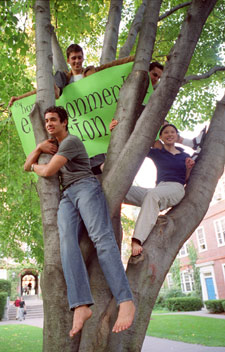Green houses (and dorms):
New program raises environmental awareness in student residences

For the first time, paid undergraduates will fan out into Harvard’s dorms and houses this year, teaching and preaching and shepherding fellow students into greater environmental awareness and action.
The FAS Inter-House Resource Efficiency Program (REP) pays 15 undergraduates for four hours of work per week. Officials involved with Harvard’s environmental, recycling and physical resources programs say they hope those four hours will return big dividends in the form of trash getting recycled, lights getting shut off, windows getting closed in the winter months, and in other energy and resource-saving ways.
“The dorms are the weakest link in [Harvard’s] recycling,” said Rob Gogan, supervisor of waste management for the Facilities Maintenance Department and a member of the REP program’s steering group.
The fact that recycling rates are lower in dorms is understandable, Gogan said, considering how busy students are, but added that he hopes to raise the rate from roughly 20 percent to close to the campuswide total of 32 percent.
“I have high hopes for the program,” Gogan said.
The program is being supported by the Faculty of Arts and Sciences’ Office of Physical Resources, the Harvard Green Campus Initiative, and University Operations Services’ Facilities Maintenance Operations. Anticipated savings from energy and waste disposal are expected to fund the entire cost of the program.
The undergraduate representatives are not in the dorms only to educate students, but also to provide feedback to Harvard officials about what is workable and what programs are not. Gogan used the ubiquitous blue recycling bins as an example. They had been placed in dormitories, but the students told Gogan they were really too large to be practical in the small rooms. Consequently, many weren’t used or were converted to other purposes, like draped with a piece of cloth and used for a table. This year, Gogan said, using funds from the Harvard Green Campus Initiative’s Loan Fund, the blue bins will be replaced with two stackable bins that will take up less floor space.
Harvard Green Campus Initiative director Leith Sharp, who also sits on the REP steering group, said making the effort to reach out to students now can pay dividends down the road. Today’s students are tomorrow’s leaders, she said, and we need them to take a heightened environmental awareness away from Harvard when they go.
“It’s important to work with the houses. This is where the students experience the ‘shadow’ curriculum of Harvard University. This is where students further develop lifelong patterns, values, and choices,” Sharp said. “If we want good citizenship to be among the qualities of our future leaders then we will do well to attend to what is being learned between classes at Harvard. Environmental and social accountability is a living practice. It requires a consciousness of impacts beyond immediate sight and facilitating this will be the role of the REP.”
In addition to teaching and potentially affecting students’ lifelong values, Sharp said the program is important because the dormitories are large consumers of resources on campus. The student REPs will begin by conducting an audit of their dorms for energy use, water conservation, and recycling opportunities, Sharp said.
Sloan Eddleston, a junior and the REP representative in Kirkland House, said he never considered himself a hard-core environmentalist, but also can’t understand why people don’t do simple things like recycle more than they do. He said he hopes to raise awareness in Kirkland about how much waste people produce and how easy it can be to reduce that waste.
“I don’t think people realize how much energy they waste on a day-to-day basis,” Eddleston said. “If we just spend an extra second recognizing that we could be recycling something instead of throwing it away … it would make much more of a significant difference than people think.”
The 10-member steering group guides the work of 15 undergraduate reps – one in each house and three in the freshman dormitories, as well as two undergraduate team captains. The undergraduate captains, Rachelle Gould and Wendy Liu, were members of the team of Harvard College Environmental Action Committee students who proposed the program this summer. They take responsibility for day-to-day supervision of the REPs.
Though there have been similar efforts focused on Harvard’s dorms in the past, Sharp said, those efforts have relied on the activities of volunteers or students doing projects for classes. The result, she said, was a fragmented approach that wasn’t entirely effective. By paying students for their time and setting job parameters, Sharp said, the program will gain consistency, both in the work of the current group and in that of their successors.
“It’s not going to fade away,” Sharp said. “There’ll be a continued rotation of employees and the handoff between generations of students will be smoother.”
For information about the program, contact program administrator Emily Sadigh at Emily_Sadigh@harvard.edu. For information on the Harvard Green Campus Initiative, visit the Web site at http://www.greencampus.harvard.edu.




